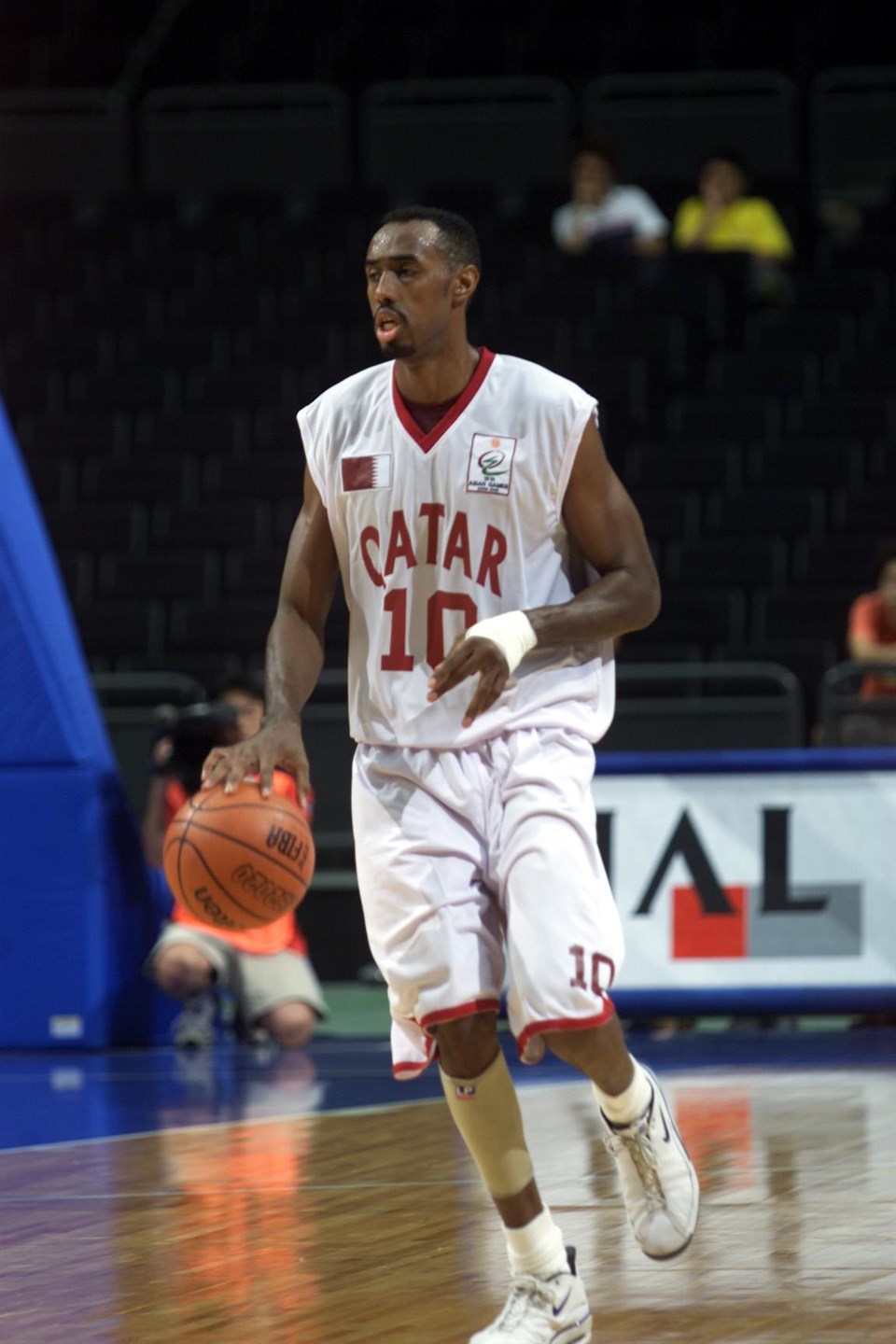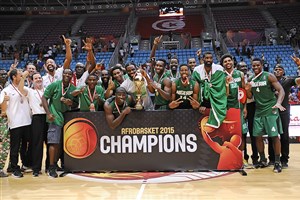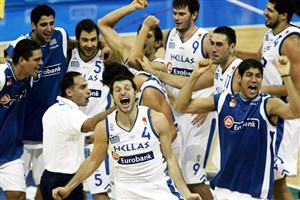
Asian Legends Series- Yasseen Ismail Musa
MANILA (Enzo Flojo's Asia on My Mind) - One of the superstars of Asian basketball in the early 21st century was Qatar's Yasseen Ismail Musa, and there's no way I'm excluding him from my Asian Legends Series.
A long-time player of Qatar's elite Al-Rayyan club and of the national team, Musa, who's now 40 years old, was among the continent's most dominant players in the early 2000s, and he is perhaps the biggest reason for Qatar's rise from obscure basketball nation to, at their peak, among the top four national teams in Asia.

Though Musa was in the spotlight for most of the 21st century's first decade, he actually debuted for Qatar's national program way back in 1998 as one of the Gulf state's U18 stars.
In the 1998 FIBA U18 Asia Cup, Musa carried Qatar to an unprecedented second-place finish overall right behind mighty China, who were led by the towering Yao Ming.
This remains Qatar's best finish ever in any main FIBA Asia competition to this day, and it enabled Al Annabi to qualify for the 1999 FIBA U19 World Cup in Lisbon, Portugal.
In that tournament, Musa announced himself to the world-leading the entire field in scoring with 25.0 points per game, outscoring even the likes of future NBA payers Andrei Kirilenko, Juan Carlos Navarro, Yuta Tabuse and Olumide Oyedeji. He was also the second-leading rebounder of the entire field with 12.4 rebounds per contest, which was right behind Oyedeji's 13.0. When the smoke cleared, Qatar had a respectable showing, splitting their eight games. The lost Croatia, Argentina and twice to Latvia, but they booked wins over Portugal, China, Japan and Venezuela.
From then, Musa rose to Qatar's men's national team, where for years he would be the squad's de facto frontman.
He next suited up in the 2001 FIBA Asia Cup in Shanghai, China, helping Qatar advance as far as the quarter-finals before getting eliminated and settling for a fifth-place finish. In his first time playing at the senior level, Musa turned a lot of heads, averaging 19.0 points per game, which was good enough for the top 4 right behind Lebanon's Fadi El Khatib, Uzbekistan's Sergey Demurin and Syria's Mohammad Iman.
In the 2003 edition of the Asia Cup, Musa was already a well-known talent, but even if opponents already knew what he could do, they still couldn't stop him from torching the hoops. Musa scored more than 18 points per game in that tournament, helping the Qataris win five of their first six games - including landmark victories over Jordan, the Philippines, Japan and Iran - en route to a third-place finish right behind East Asia powerhouse sides China and Korea. It was Qatar's first time to finish on the podium at the Asia Cup, and it wouldn't be the last.
The next Asia Cup was hosted in Doha, Qatar in 2005, with Musa and his cohorts finally playing in front of their hometown fans. Gradually improving over the last two editions, Qatar were expecting an even stronger performance on their home soil, and they were aiming for no less than the championship and qualification for the 2006 FIBA Basketball World Cup to be held in Japan.
The Qataris easily swept their first-round group, beating Japan, Indonesia and Kazakhstan by double-digits. They had much tougher opponents in their quarter-final group as they were pooled with Korea, Iran and Jordan, but again Al Annabi recorded convincing wins, beating their foes by an average difference of 19.0 points. That enabled them to break into the semi-finals for the second straight edition, but now they were the heavy favorites to advance despite the fact they were facing the top West Asia squad at that time, Lebanon.
It was a nip-tuck affair against the Lebanese all throughout their semi-finals match, but the Cedars eventually edged out the home team, 83-79. Musa impressed anew, scoring 14 points on 6-of-8 field goal shooting, but his team had no answer for Lebanon's Rony Fahed and Fadi El Khatib, who combined to score 49. Qatar would eventually settle for third place again, coming from behind to pull the rug from under erstwhile tormentors Korea, 89-77. That triumph also enabled Musa and his teammates to book their tickets to the Basketball World Cup the following year.
2006 was a big year for Qatari hoops as the national team played on the world's biggest basketball stage for the first time in their history. Unfortunately, Musa was dropped from the national team roster by then-coach Joey Stiebing for what the latter expressed as "conduct detrimental to the team." Without their top scorer, Qatar floundered in the World Cup, losing all five of their games. They have yet to return to the world stage since then.
Musa returned with a vengeance in the 2007 FIBA Asia Cup in Tokushima, Japan, leading the national team again in scoring with 13.9 points per game as they finished with a 5-win, 3-loss record, though they tumbled out of the podium and landed on 7th place.
In the 2009 edition, Qatar improved on their showing, finishing at 6th place, though Musa's scoring was toned down as the 6ft 8in/2.03m forward put up just 8.6 points per contest. That started a bit of a downward spiral both for Musa and for the Qatari national squad.

Musa skipped the 2011 edition of the Asia Cup in Wuhan, China, and perhaps it was a good thing he did because the Qataris dealt with a slew of eligibility issues and lost all their games, including a couple of games by forfeit. Aiming for redemption in 2013, Qatar called Musa back up to the national team, which played at the Asia Cup in Manila, Philippines. Knowing he was in the twilight of his international career, Musa was hoping Qatar would successfully qualify for the 2014 FIBA Basketball World Cup in Spain, though that meant they would have to finish among the top three teams in this tournament.
The competition started well for Musa & Co. as they swept their first group with wins over Japan and Hong Kong. They then went 2-1 in the second round, beating Jordan and Chinese Taipei but losing to home team Philippines. Still, it was good enough for them to advance to the knockout quarter-finals, where they had to play title contenders Korea.
In that do-or-die game against the Koreans, Qatar played from behind from opening tip, and though Musa along with naturalized player Jarvis Hayes tried to rally their side, they fell in a lopsided loss, 79-52. With their World Cup hopes dashed, Qatar split their last two classification matches and finished 6th place overall. Musa scored 10.7 points per game in that tournament, which, as fate would have it, would be his final Asia Cup appearance.
Shortly after the Manila tournament, Musa announced his retirement from the senior national team, though he continued to play professionally for Al Rayyan and continued to carry the country's colors on a different stage, helping Qatar win the 2014 FIBA 3x3 World Championship.
Musa actually enjoyed more success on the club level, helping Al Rayyan to two FIBA Asia Champions Cup titles (2002, 2005) and finishing 2nd place in four other editions (2003, 2008, 2010, 2013). With Musa as the spearhead, Al Rayyan was among the elite club teams in the continent.
View this post on Instagram
After his retirement, Musa recalled the milestones of his illustrious career, saying, "We started almost from scratch and kept building the team year after year. Overall, I bagged 46 titles for Al Rayyan and 16 for the national team (including regional/subzone competitions)."
Musa has been such a successful and iconic figure in Qatari basketball that Al Rayyan retired his jersey number (Nº10). He is a clear example of a player who blazed a trail for his club and country and opened doors that otherwise would have likely remained closed. Without a player like Musa, Qatari basketball would probably have never reached the heights they did more than a decade ago.
Enzo Flojo
FIBA
FIBA's columnists write on a wide range of topics relating to basketball that are of interest to them. The opinions they express are their own and in no way reflect those of FIBA.
FIBA takes no responsibility and gives no guarantees, warranties or representations, implied or otherwise, for the content or accuracy of the content and opinion expressed in the above article.


















